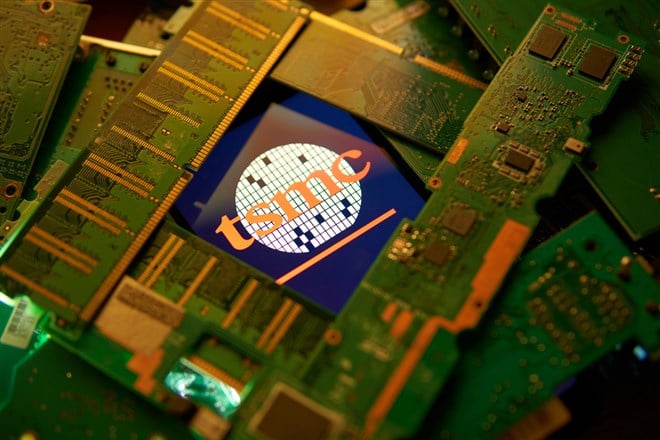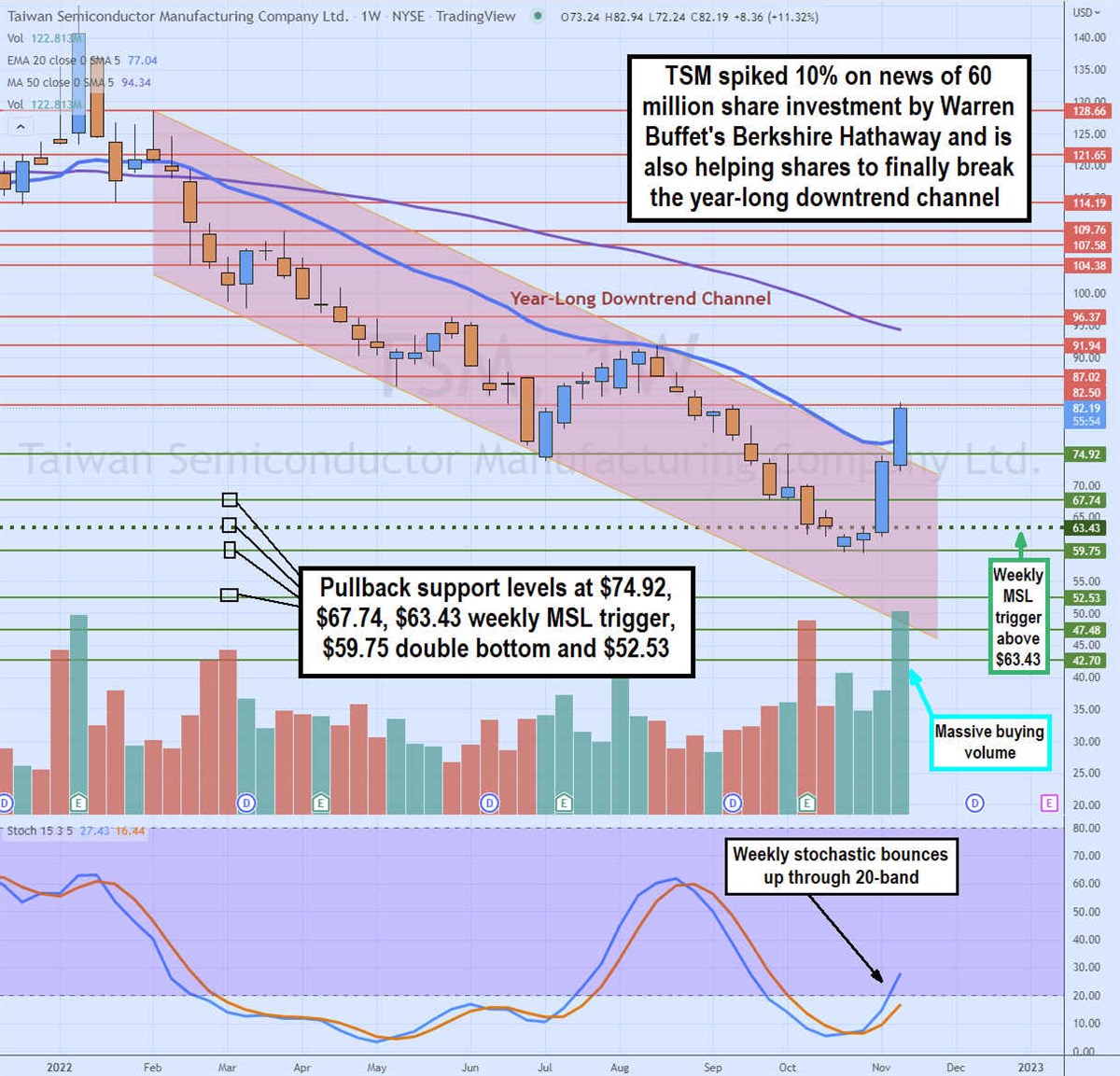 On Nov. 14, 2022, Warren Buffet’s Berkshire Hathaway (NYSE: BRK.A) reported a new investment in its quarterly 13-F filing indicating a 60.1 million share stake in one of the world’s most dominant semiconductor maker Taiwan Semiconductor Manufacturing Company (NYSE: TSM) stock. This sent shares sky rocketing 10% higher. While his $4.1 billion stake only gives a bit over 1% of the outstanding shares, it’s his actions that have spurred a rally in TSM and the semiconductor stocks. His reputation as one of the greatest investors of all-times provides an instant premium to the companies he invests in. Countless fund managers and retail investors follow his every investment move and commonly follow him into positions after they are revealed in SEC filings. TSM shares spiked over 10% on the news. Before chasing the stock, it’s prudent to analyze the underlying Company’s operations. Taiwan Semi has brought capacity back online to improve the global supply chain for semiconductors and is firing on all cylinders.
On Nov. 14, 2022, Warren Buffet’s Berkshire Hathaway (NYSE: BRK.A) reported a new investment in its quarterly 13-F filing indicating a 60.1 million share stake in one of the world’s most dominant semiconductor maker Taiwan Semiconductor Manufacturing Company (NYSE: TSM) stock. This sent shares sky rocketing 10% higher. While his $4.1 billion stake only gives a bit over 1% of the outstanding shares, it’s his actions that have spurred a rally in TSM and the semiconductor stocks. His reputation as one of the greatest investors of all-times provides an instant premium to the companies he invests in. Countless fund managers and retail investors follow his every investment move and commonly follow him into positions after they are revealed in SEC filings. TSM shares spiked over 10% on the news. Before chasing the stock, it’s prudent to analyze the underlying Company’s operations. Taiwan Semi has brought capacity back online to improve the global supply chain for semiconductors and is firing on all cylinders.The World’s Largest Chipmaker
Taiwan Semiconductor is a contract computer chip maker. It owns fabrication plants (FABs) that manufacture chips to client specifications. Fabs are notoriously expensive and time consuming to build. Intel (NASDAQ: INTC) manufactures its own chips through its own fabs and is planning on bolstering its contract business. Taiwan Semi produces nearly 80% of the world’s semiconductors for some of the most well-recognized brand like Apple (NASDAQ: AAPL) which is its largest customer, Applied Micro Devices (NYSE: AMD), Broadcom (NASDAQ: AVGO), Marvell Technologies (NASDAQ: MRVL), MediaTek, Qualcomm (NASDAQ: QCOM), and Nvidia (NASDAQ: NVDA). The Company is extremely profitable with 57.3% gross profit margins. The pandemic lockdowns and subsequent reopenings caused chip demand to surge while supply was thin as fabs were taken offline and needed to get back into production. This was the major reason for the supply chain disruption that saw automakers like Ford Motor (NYSE: F) and General Motors (NYSE: GM) to slowdown their new car production due to the shortage of computer chips. The supply chain has been improving as production capacity returns back to normal. The Company plans to build another multi-billion dollar Arizona factory in addition to the $12 billion investment committed two-years ago, according to The Wall Street Journal.
Firing on All Cylinders
On Oct. 13, 2022, Taiwan Semi released its fiscal third-quarter 2022 results for the quarter ending September 2022. The financials were reported in New Taiwan dollars or NT$. The Company reported an earnings-per-share (EPS) profit of NT$10.83 excluding non-recurring items versus consensus analyst estimates for a profit of NT$10.39, a NT$0.44 beat. Revenues grew 47.9% year-over-year (YoY) to NT$613.14 billion beating analyst estimates for NT$607.97 billion. Demand was driven by strong demand in the 5-nanometer (N5) technologies.
CEO Comments
Taiwan Semi CEO C.C. Wei commented, “Looking ahead to 2023 with the successful ramp up of N5, N4P, N4X and the upcoming ramp of N3, we're continuing to expand our customer product portfolio and increase our addressable market. While the ongoing semiconductor inventory correction will affect the first half 2023 utilization rate, we expect our business to be supported by stronger demand for our differentiated and leading advanced and specialty technologies, and for 2023 to be a growth year for TSMC.” N3 is expected to ramp up volume in 2023 as demand is stronger than its supply. N3 revenues are expected to perform stronger in 2023 than N5 sales in its first year 2020. He added, “Our 3-nanometer technology will be the most advanced semiconductor technology in both PPA and transistor technology when it is introduced. We are confident that N3 family will be another large and long-lasting node for TSMC.” Smartphones and high-performance computing (HPC) are driving the demand.
China Risk
Investors must be aware of the geopolitical tensions happening between China and Taiwan and the U.S. China believes that Taiwan is a province of the People’s Republic of China (PRC), but Taiwan is an independent country as the Republic of China (ROC) ever since 1949. Since Taiwan produces the majority of the computer chips in the world, the U.S. has an interest in the independence of Taiwan as a trading partner under democratic rule. So far, it’s just been a battle of words, but an invasion of Taiwan by China is a possibility that can’t be ruled out. The Biden administration has implemented semiconductor restrictions to China which will impact AMD and NVDA’s artificial intelligence (AI) chip sales in 2023. The administration has signed the $50 billion CHIPS and Science Act in October 2022 to bolster semiconductor production in the U.S. by investing in fabs.
Year-Long Weekly Downtrend Channel Reversal
On the weekly candlestick chart, TSM has been in a weekly downtrend channel since February 2022 and rejecting off the falling weekly 20-period exponential moving average (EMA) twice. The stock put in a weekly swing low and monthly double bottom near the $59.75 level. The weekly stochastic coiled like a spring back up through the 20-band triggering the weekly market structure low (MSL) above $63.43. TSM finally broke through the weekly 20-period EMA resistance at $77.04, but the 50-period MA resistance continues to grind down at $94.34. The volume surged on the 13-F filing squeezing short-sellers as buyers chase shares higher. Pullback support levels to watch sit at $74.92, $67.73, $63.43 weekly MSL trigger, $58.75 monthly double bottom, and $52.53.



